The Health bulletin [serial] - University of North Carolina at Chapel Hill
The Health bulletin [serial] - University of North Carolina at Chapel Hill
The Health bulletin [serial] - University of North Carolina at Chapel Hill
You also want an ePaper? Increase the reach of your titles
YUMPU automatically turns print PDFs into web optimized ePapers that Google loves.
March, 1955<strong>The</strong> <strong>Health</strong> Bulletinadequ<strong>at</strong>e pay based on training, responsibilitiesand efficiency. Too <strong>of</strong>tenwe begin with the established salariesand then, when funds become available,every member <strong>of</strong> the staff receives apercentage increase without consider<strong>at</strong>ion<strong>of</strong> his qualific<strong>at</strong>ions or efficiencyin his assigned task. Job tenure andpromotion should be based on qualityand effectiveness <strong>of</strong> work r<strong>at</strong>her thanon the personality pull <strong>of</strong> individuals.<strong>The</strong>re must be a good record system.Assuming th<strong>at</strong> we have a smooth-running<strong>of</strong>fice with a good record systemand suitable arrangements for orient<strong>at</strong>ionand training, we are still facedwith the necessity <strong>of</strong> having the entirestaff oper<strong>at</strong>e as a unit. <strong>The</strong> staff shouldfunction as a unit in a democr<strong>at</strong>icmanner, using group opinions on broadpolicies and individual conferenceswhen it concerns one individual's work.<strong>The</strong>re should be not only frequent conferences<strong>of</strong> supervisory personnel inlarge units but regular meetings <strong>of</strong> theentire staff. In small units withoutsupervisory personnel, the entire staffshould meet frequently. All <strong>of</strong> these arenecessary if the staff is to have a feeling<strong>of</strong> security and contentment.Efficient Management <strong>of</strong> IndividualMembers <strong>of</strong> Staff. An entire staff cansometimes be upset by the personality<strong>of</strong> one individual. This is where an administr<strong>at</strong>orfaces his most difficult andagonizing problem. In all such casesone should remember th<strong>at</strong> emotionalproblems and personality defects arenot self-limiting diseases and cannot becured by tre<strong>at</strong>ment <strong>of</strong> symptoms andwaiting for the crisis to pass. <strong>The</strong> basiccauses must be found and tre<strong>at</strong>ed orelimin<strong>at</strong>ed. Failing in this, the employemust be discharged. Even the smalleststaff is larger and more important thanthe individual member. However, emotionallystable individuals can be upsetby continued unstable working conditions.Every effort should be made toavoid them. All workers and their workneed a reasonable amount <strong>of</strong> supervisionand evalu<strong>at</strong>ion. This is neededto correct or improve faulty and inferiorwork and to praise good work.Every staff member's work, good orbad, justifies recognition by the manager.Too <strong>of</strong>ten we overlook bad workand fail to praise good work. Everyhuman, in addition to his emotionalneed for love and security, craves recognitionand the assurance th<strong>at</strong> he andhis work are significant. <strong>The</strong> deleg<strong>at</strong>ion<strong>of</strong> authority and responsibility carrieswith it the oblig<strong>at</strong>ion <strong>of</strong> sufficientsupervision and guidance to insure efficientdischarge <strong>of</strong> duty.Every staff member's efficiency can beimproved by additional training and individualguidance. This can be done bythe administr<strong>at</strong>or, the supervisor or afellow staff worker who has had thebenefit <strong>of</strong> better training and/or experience.When a new member is addedto the staff, it is necessary th<strong>at</strong> hehave a reasonable period <strong>of</strong> orient<strong>at</strong>ion,even though he may have an adequ<strong>at</strong>eeduc<strong>at</strong>ion and prior experience with anotherdepartment. This need for orient<strong>at</strong>ionis imper<strong>at</strong>ive when there hasbeen no previous experience in publichealth work. Part <strong>of</strong> it is better givenby a unit th<strong>at</strong> has a large and welltrained staff and should be taken in acounty other than the one in which heis being employed, because, when astaff begins to orient its own employes,the tendency is to shift them into theirregular assignments without adequ<strong>at</strong>eoverall orient<strong>at</strong>ion in public healthpractices. Postgradu<strong>at</strong>e and in-servicetraining is likewise mand<strong>at</strong>ory for thosewho have not had any. Like orient<strong>at</strong>ion,this in-service training should be givenby those who are able to teach anddemonstr<strong>at</strong>e public health activities,preferably in a well organized departmentadequ<strong>at</strong>ely staffed for this purpose.Efficient Management by IndividualStaff Workers. Individual staff workersare managers in the same manner asadministr<strong>at</strong>ors and supervisors. It istrue th<strong>at</strong> their responsibilities and thescope <strong>of</strong> their activities are more limited.However, they have the same responsibilityfor the efficient planningand conduct <strong>of</strong> their work. It is theirresponsibility to function as a member<strong>of</strong> the team. <strong>The</strong>y must keep adequ<strong>at</strong>edaily, weekly and monthly records


![The Health bulletin [serial] - University of North Carolina at Chapel Hill](https://img.yumpu.com/43204263/43/500x640/the-health-bulletin-serial-university-of-north-carolina-at-chapel-hill.jpg)
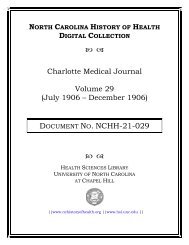
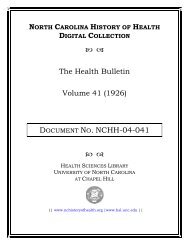
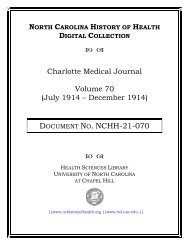
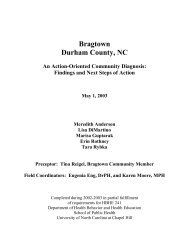
![Bulletin of the North Carolina Board of Health [serial] - University of ...](https://img.yumpu.com/48032016/1/153x260/bulletin-of-the-north-carolina-board-of-health-serial-university-of-.jpg?quality=85)
![The Health bulletin [serial] - University of North Carolina at Chapel Hill](https://img.yumpu.com/47603625/1/169x260/the-health-bulletin-serial-university-of-north-carolina-at-chapel-hill.jpg?quality=85)
![The Health bulletin [serial] - University of North Carolina at Chapel Hill](https://img.yumpu.com/47242858/1/169x260/the-health-bulletin-serial-university-of-north-carolina-at-chapel-hill.jpg?quality=85)
![The Health bulletin [serial] - University of North Carolina at Chapel Hill](https://img.yumpu.com/41981074/1/163x260/the-health-bulletin-serial-university-of-north-carolina-at-chapel-hill.jpg?quality=85)
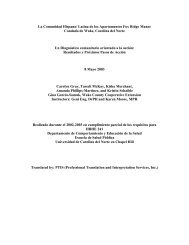
![The Health bulletin [serial] - University of North Carolina at Chapel Hill](https://img.yumpu.com/40912928/1/164x260/the-health-bulletin-serial-university-of-north-carolina-at-chapel-hill.jpg?quality=85)
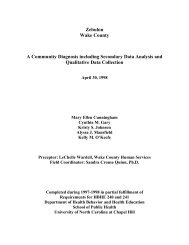
![The Health bulletin [serial] - University of North Carolina at Chapel Hill](https://img.yumpu.com/35643061/1/167x260/the-health-bulletin-serial-university-of-north-carolina-at-chapel-hill.jpg?quality=85)
![Biennial report of the North Carolina State Board of Health [serial]](https://img.yumpu.com/34024350/1/166x260/biennial-report-of-the-north-carolina-state-board-of-health-serial.jpg?quality=85)
